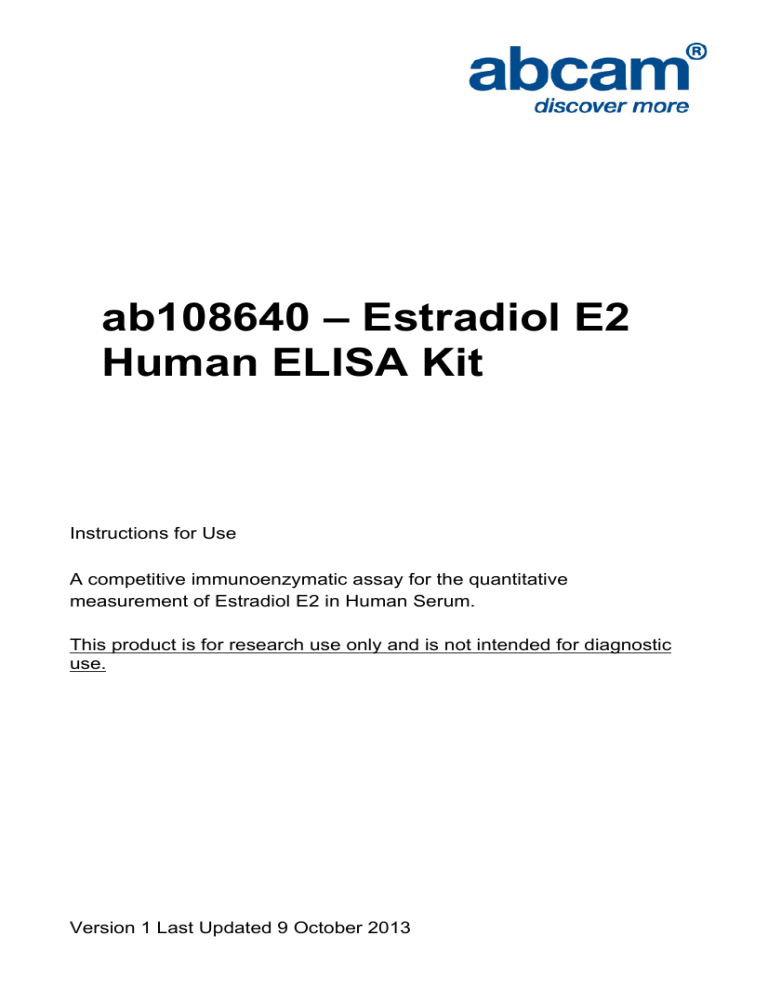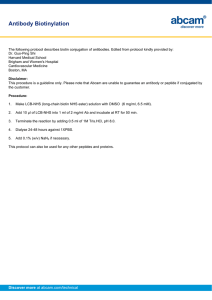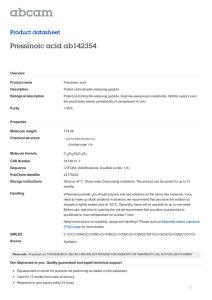
ab108640 – Estradiol E2
Human ELISA Kit
Instructions for Use
A competitive immunoenzymatic assay for the quantitative
measurement of Estradiol E2 in Human Serum.
This product is for research use only and is not intended for diagnostic
use.
Version 1 Last Updated 9 October 2013
Table of Contents
INTRODUCTION
1.
BACKGROUND
2.
ASSAY SUMMARY
3.
PRECAUTIONS
2
4
5
GENERAL INFORMATION
4.
5.
6.
7.
8.
STORAGE AND STABILITY
MATERIALS SUPPLIED
MATERIALS REQUIRED, NOT SUPPLIED
LIMITATIONS
TECHNICAL HINTS
5
5
6
7
8
ASSAY PREPARATION
9.
10.
11.
REAGENT PREPARATION
SAMPLE COLLECTION AND STORAGE
PLATE PREPARATION
9
9
9
ASSAY PROCEDURE
12.
ASSAY PROCEDURE
10
DATA ANALYSIS
13.
14.
15.
16.
CALCULATIONS
TYPICAL DATA
TYPICAL SAMPLE VALUES
ASSAY SPECIFICITY
12
13
14
16
RESOURCES
17.
18.
TROUBLESHOOTING
NOTES
Discover more at www.abcam.com
17
19
1
INTRODUCTION
1. BACKGROUND
Abcam’s Estradiol E2 in vitro competitive ELISA (Enzyme-Linked
Immunosorbent Assay) kit is designed for the accurate quantitative
measurement of Estradiol E2 in Human serum.
A 96-well plate has been pre-coated with goat anti-rabbit IgG.
Samples, standards and the rabbit anti-Estradiol E2 Reagent and
Estradiol E2-HRP conjugate are added to the wells, where Estradiol E2
in the sample competes with the added Estradiol E2-HRP for antibody
binding. After incubation, the wells are washed to remove unbound
material and TMB substrate is then added which is catalyzed by HRP
to produce blue coloration. The reaction is terminated by addition of
Stop Solution which stops the color development and produces a color
change from blue to yellow. The intensity of signal is inversely
proportional to the amount of Estradiol E2 in the sample and the
intensity is measured at 450 nm.
Estradiol E2 is a C18 steroid hormone with a phenolic A ring. This
steroid hormone has a molecular weight of 272.4. It is the most potent
natural Estrogen, produced mainly by the ovary, placenta, and in
smaller amounts by the adrenal cortex, and the male testes.
Estradiol E2 is secreted into the blood stream where 98% of it
circulates bound to sex hormone binding globulin (SHBG). To a lesser
extent it is bound to other serum proteins such as albumin. Only a tiny
fraction circulates as free hormone or in the conjugated form.
Estrogenic activity is affected via estradiol-receptor complexes which
trigger the appropriate response at the nuclear level in the target sites.
These sites include the follicles, uterus, breast, vagina, urethra,
hypothalamus, pituitary and to a lesser extent the liver and skin.
In non-pregnant women with normal menstrual cycles, estradiol
secretion follows a cyclic, biphasic pattern with the highest
concentration found immediately prior to ovulation. The rising estradiol
Discover more at www.abcam.com
2
INTRODUCTION
concentration is understood to exert a positive feedback influence at
the level of the pituitary where it influences the secretion of the
Gonadotropin, follicle stimulating hormone (FSH), and luteinizing
hormone (LH), which are essential for follicular maturation and
ovulation, respectively. Following ovulation, estradiol levels fall rapidly
until the luteal cells become active resulting in a secondary gentle rise
and plateau of estradiol in the luteal phase. During pregnancy,
maternal serum Estradiol levels increase considerably, to well above
the pre-ovulatory peak levels and high levels are sustained throughout
pregnancy.
Serum Estradiol measurements are a valuable index in evaluating a
variety of menstrual dysfunctions such as precocious or delayed
puberty in girls and primary and secondary amenorrhea and
menopause. Estradiol levels have been reported to be increased in
patients with feminizing syndromes, gynaecomastia and testicular
tumors.
In cases of infertility, serum Estradiol measurements are useful for
monitoring induction of ovulation following treatment with, for example,
clomiphene citrate, LH-releasing hormone (LH-RH), or exogenous
Gonadotropin. During ovarian hyperstimulation for in vitro fertilization
(IVF), serum estradiol concentrations are usually monitored daily for
optimal timing of Human chorionic Gonadotropin administration and
oocyte collection.
Discover more at www.abcam.com
3
INTRODUCTION
2. ASSAY SUMMARY
Prepare all reagents, samples and
controls as instructed.
Add samples and controls to wells used.
Incubate at 37°C.
Wash each well and add prepared
labeled HRP-Conjugate. Incubate at room
temperature.
After washing, add TMB substrate
solution to each well. Incubate at room
temperature. Add Stop Solution to each
well. Read immediately.
Discover more at www.abcam.com
4
GENERAL INFORMATION
3. PRECAUTIONS
Please read these instructions carefully prior to beginning the
assay.
All kit components have been formulated and quality control tested to
function successfully as a kit. Modifications to the kit components or
procedures may result in loss of performance.
4. STORAGE AND STABILITY
Store kit at 2-8°C immediately upon receipt.
Refer to list of materials supplied for storage conditions of individual
components. Observe the storage conditions for individual prepared
components in section 9. Reagent Preparation.
5. MATERIALS SUPPLIED
Item
Goat anti-rabbit IgG Coated Microplate
(12 x 8 wells)
Stop Solution
Amount
Storage
Condition
(Before
Preparation)
96 Wells
2-8°C
11 mL
2-8°C
Estradiol E2 HRP Conjugate
12 mL
2-8°C
Rabbit anti-Estradiol E2 Reagent
7 mL
2-8°C
TMB Substrate Solution
11 mL
2-8°C
Estradiol Control 1
0.5 mL
2-8°C
Estradiol Control 2
0.5 mL
2-8°C
Estradiol E2 Standard 0 – 0 pg/mL
0.5 mL
2-8°C
Estradiol E2 Standard 1 – 10 pg/mL
0.5 mL
2-8°C
Estradiol E2 Standard 2 – 30 pg/mL
0.5 mL
2-8°C
Estradiol E2 Standard 3 – 100 pg/mL
0.5 mL
2-8°C
Estradiol E2 Standard 4 – 300 pg/mL
0.5 mL
2-8°C
Estradiol E2 Standard 5 – 1,000 pg/mL
0.5 mL
2-8°C
Discover more at www.abcam.com
5
GENERAL INFORMATION
6. MATERIALS REQUIRED, NOT SUPPLIED
These materials are not included in the kit, but will be required to
successfully utilize this assay:
Microplate reader capable of measuring absorbance at 450 nm or
620 nm
Incubator at 37°C
Multi- and single-channel pipettes to deliver volumes between
10 and 1,000 µL
Optional: Automatic plate washer for rinsing wells.
Rotating mixer
Deionised or (freshly) distilled water.
Disposable tubes
Timer
Absorbent paper or paper towel.
Discover more at www.abcam.com
6
GENERAL INFORMATION
7. LIMITATIONS
ELISA kit intended for research use only. Not for use in diagnostic
procedures
All components of Human origin used for the production of these
reagents have been tested for anti-HIV antibodies, anti-HCV
antibodies and HBsAg and have been found to be non-reactive.
Nevertheless, all materials should still be regarded and handled as
potentially infectious
Use only clean pipette tips, dispensers, and lab ware
Do not interchange screw caps of reagent vials to avoid crosscontamination
Close reagent vials tightly immediately after use to avoid
evaporation and microbial contamination
After first opening and subsequent storage check conjugate and
control vials for microbial contamination prior to further use
To avoid cross-contamination and falsely elevated results pipette
patient samples and dispense conjugate, without splashing,
accurately to the bottom of wells
Serum samples demonstrating gross lipemia, gross hemolysis, or
turbidity should not be used with this test.
Discover more at www.abcam.com
7
GENERAL INFORMATION
8. TECHNICAL HINTS
Avoid foaming
components
Avoid cross contamination of samples or reagents by changing tips
between sample, standard and reagent additions
Ensure plates are properly sealed or covered during incubation
steps
Complete removal of all solutions and buffers during wash steps is
necessary for accurate measurement readings
Addition of the TMB Substrate solution initiates a kinetic reaction,
which is terminated by the addition of the Stop Solution. Therefore,
the TMB Substrate and the Stop Solution should be added in the
same sequence to eliminate any time deviation during the reaction
It is important that the time of reaction in each well is held constant
for reproducible results. Pipetting of samples should not extend
beyond ten minutes to avoid assay drift. If more than 10 minutes
are needed, follow the same order of dispensation. If more than
one plate is used, it is recommended to repeat the dose response
curve in each plate
Good laboratory practice requires that controls are run with each
calibration curve. A statistically significant number of controls
should be assayed to establish mean values and acceptable
ranges to assure proper performance.
The incomplete or inaccurate liquid removal from the wells could
influence the assay precision and/or increase the background
This kit is sold based on number of tests. A ‘test’ simply
refers to a single assay well. The number of wells that contain
sample, control or standard will vary by product. Review the
protocol completely to confirm this kit meets your
requirements. Please contact our Technical Support staff
with any questions
or
bubbles
Discover more at www.abcam.com
when
mixing
or
reconstituting
8
ASSAY PREPARATION
9. REAGENT PREPARATION
Equilibrate all reagents, samples and controls to room temperature
(18-25°C) prior to use.
All solutions are supplied ready to use
10. SAMPLE COLLECTION AND STORAGE
The determination of Estradiol E2 can be performed in Human
serum. Microbiologically contaminated, highly lipemic or
haemolysed should not be used in the assay. Samples containing
sodium azide should not be used. If the assay is performed on the
same day of sample collection, the specimen should be kept at
2-8°C; otherwise it should be aliquoted and stored deep-frozen
(-20°C). If samples are stored frozen, mix thawed samples gently
for 5 minutes before testing.
Avoid repeated freezing and thawing
Samples with expected Estradiol concentrations over 1,000 pg/mL
may be quantitated by dilution.
11. PLATE PREPARATION
The 96 well plate strips included with this kit are supplied ready to
use. It is not necessary to rinse the plate prior to adding reagents
Unused well strips should be returned to the plate packet and
stored at 4°C
For each assay performed, a minimum of 1 well must be used as a
blank, omitting sample and conjugate from well addition
For statistical reasons, we recommend each standard and sample
should be assayed with a minimum of two replicates (duplicates)
Discover more at www.abcam.com
9
ASSAY PROCEDURE
12. ASSAY PROCEDURE
Equilibrate all materials and prepared reagents to room
temperature prior to use.
Please read the test protocol carefully before performing the
assay. Result reliability depends on strict adherence to the
test protocol as described.
If performing the test on ELISA automatic systems we
recommend increasing the washing steps from three to five
and the volume of washing solution from 300 µL to 350 µL to
avoid washing effects.
Assay all standards and samples in duplicate.
13.1. Prepare all reagents, working standards, and samples as
directed in the previous sections.
13.2. Remove excess microplate strips from the plate frame,
return them to the foil pouch containing the desiccant pack,
reseal and return to 4°C storage.
13.3. Add 25 µL standards, control and samples into their
respective wells.
13.4. Add 100 µL of Estradiol-HRP conjugate into each well.
13.5. Add 50 µL of rabbit anti-Estradiol reagent into each well.
Mix gently for 30 seconds.
Note: Complete mixing is essential for good assay
performance
13.6. Cover wells with the foil supplied in the kit and incubate at
room temperature for 90 minutes.
13.7. Remove the foil, aspirate the contents of the wells and
wash each well five times with 300 µL of deionized or
distilled water. Avoid spill over into neighboring wells. The
soak time between each wash cycle should be >5 sec. After
the last wash, remove the remaining deionized or distilled
water by aspiration or decanting. Invert the plate and blot it
against clean paper towels to remove excess liquid.
Discover more at www.abcam.com
10
ASSAY PROCEDURE
Note: Complete removal of liquid at each step is essential
for good assay performance.
13.8. Add 100 µL TMB Reagent into each well. Gentle mix for
10 seconds.
13.9. Incubate at room temperature for 20 minutes in the dark.
13.10. Stop the reaction by adding 100 µL of Stop Solution to each
well. Mix gently for 30 seconds.
Note: It is important to make sure that all the blue color
changes to yellow color completely.
13.11. Measure the absorbance of the sample at 450 nm within
15 minutes of addition of the Stop Solution.
Discover more at www.abcam.com
11
DATA ANALYSIS
13. CALCULATIONS
Calculate the mean background subtracted absorbance for each point
of the standard curve and each sample. Plot the mean value of
absorbance of the standards against concentration. Draw the best-fit
curve through the plotted points. (e. g.: Four Parameter Logistic).
Interpolate the values of the samples on the standard curve to obtain
the corresponding values of the concentrations expressed in pg/mL.
Discover more at www.abcam.com
12
DATA ANALYSIS
14. TYPICAL DATA
TYPICAL STANDARD CURVE – Data provided for demonstration
purposes only. A new standard curve must be generated for each
assay performed.
Conc.
(pg/mL)
0
Mean
O.D. (-Blank)
2.943
10
2.551
30
2.055
100
1.624
300
0.925
1,000
0.571
Discover more at www.abcam.com
13
DATA ANALYSIS
15. TYPICAL SAMPLE VALUES
REFERENCE VALUESEach laboratory should establish its own normal range based on the
patient population. The Estradiol E2 Human ELISA was performed on
randomly selected outpatient clinical laboratory samples. The results of
these determinations are as follows:
Males
Females
Postmenopausal phase
Ovulating early follicular
Ovulating late follicular
Ovulating luteal phase
Pregnant normal
Prepubertal children normal
< 60 pg/mL
< 18 pg/mL
30 - 100 pg/mL
100 - 400 pg/mL
60 - 150 pg/mL
Up to 35,000 pg/mL
< 10 pg/mL
SENSITIVITY –
The minimum detectable concentration of the Estradiol ELISA assay
as measured by 2 SD from the mean of a zero standard is estimated to
be 10 pg/mL.
Discover more at www.abcam.com
14
DATA ANALYSIS
PRECISION –
Number of
replicates
24
Estradiol E2
(pg/mL)
13
3
Intra-Assay
%CV
24.1
24
73
7
10.3
24
247
10
4.1
24
633
31
4.9
Number of
replicates
20
Estradiol E2
(pg/mL)
14
S.D.
4
Inter-Assay
%CV
26.7
S.D.
20
82
8
10.3
20
264
17
6.4
20
691
45
6.6
RECOVERY –
Various patient serum samples of known Estradiol levels were
combined and assayed in duplicate. The mean recovery was 101.3%.
Pair
No.
Expected
[Estradiol]
(pg/mL)
Observed
[Estradiol]
(pg/mL)
% Recovery
1
2
3
4
5
6
7
580
810
280
265
81
62
18
599
733
249
285
91
67
18
103.3
90.4
89.2
107.5
112.6
107.3
98.7
Discover more at www.abcam.com
15
DATA ANALYSIS
16. ASSAY SPECIFICITY
CROSS REACTIVITY –
The cross reaction of the antibody calculated at 50% is:
Estradiol
100 %
Estrone
2.10 %
Estriol
1.50 %
17a Estradiol
0.30 %
Cortisol
<0.01 %
Cortisone
<0.01 %
Progesterone
<0.01 %
Testosterone
<0.01 %
DHEA-Sulphate
<0.01 %
5a-Dihydrotestosterone
<0.01 %
Discover more at www.abcam.com
16
RESOURCES
17. TROUBLESHOOTING
Problem
Cause
Incubation time to
short
Low signal
Precipitate can form
in wells upon
substrate addition
when concentration of
target is too high
Using incompatible
sample type (e.g.
serum vs. cell extract)
Solution
Try overnight incubation at 4 °C
Increase dilution factor of sample
Detection may be reduced
or absent in untested sample types
Sample prepared
incorrectly
Ensure proper sample
preparation/dilution
Bubbles in wells
Ensure no bubbles present prior to
reading plate
All wells not washed
equally/thoroughly
Check that all ports of plate washer
are unobstructed/wash wells as
recommended
Incomplete reagent
mixing
Ensure all reagents/master mixes
are mixed thoroughly
Inconsistent pipetting
Use calibrated pipettes & ensure
accurate pipetting
Inconsistent sample
preparation or storage
Ensure consistent sample
preparation and optimal
sample storage conditions
(e.g. minimize freeze/thaws cycles)
Discover more at www.abcam.com
17
Large CV
RESOURCES
Problem
Cause
Solution
Wells are insufficiently
washed
Wash wells as per protocol
recommendations
Contaminated wash
buffer
Make fresh wash buffer
Waiting too long to
read plate after
adding stop solution
Read plate immediately
after adding stop solution
Improper storage of
ELISA kit
Store all reagents as
recommended. Please note all
reagents may not have identical
storage requirements.
Using incompatible
sample type (e.g.
Serum vs. cell extract)
Detection may be reduced
or absent in untested sample types
Discover more at www.abcam.com
18
High
background
Low
sensitivity
RESOURCES
18. NOTES
Discover more at www.abcam.com
19
RESOURCES
Discover more at www.abcam.com
20
RESOURCES
Discover more at www.abcam.com
21
RESOURCES
Discover more at www.abcam.com
22
UK, EU and ROW
Email: technical@abcam.com | Tel: +44-(0)1223-696000
Austria
Email: wissenschaftlicherdienst@abcam.com | Tel: 019-288-259
France
Email: supportscientifique@abcam.com | Tel: 01-46-94-62-96
Germany
Email: wissenschaftlicherdienst@abcam.com | Tel: 030-896-779-154
Spain
Email: soportecientifico@abcam.com | Tel: 911-146-554
Switzerland
Email: technical@abcam.com
Tel (Deutsch): 0435-016-424 | Tel (Français): 0615-000-530
US and Latin America
Email: us.technical@abcam.com | Tel: 888-77-ABCAM (22226)
Canada
Email: ca.technical@abcam.com | Tel: 877-749-8807
China and Asia Pacific
Email: hk.technical@abcam.com | Tel: 108008523689 (中國聯通)
Japan
Email: technical@abcam.co.jp | Tel: +81-(0)3-6231-0940
www.abcam.com | www.abcam.cn | www.abcam.co.jp
Copyright © 2013 Abcam, All Rights Reserved. The Abcam logo is a registered trademark.
All information / detail is correct at time of going to print.
RESOURCES
23



